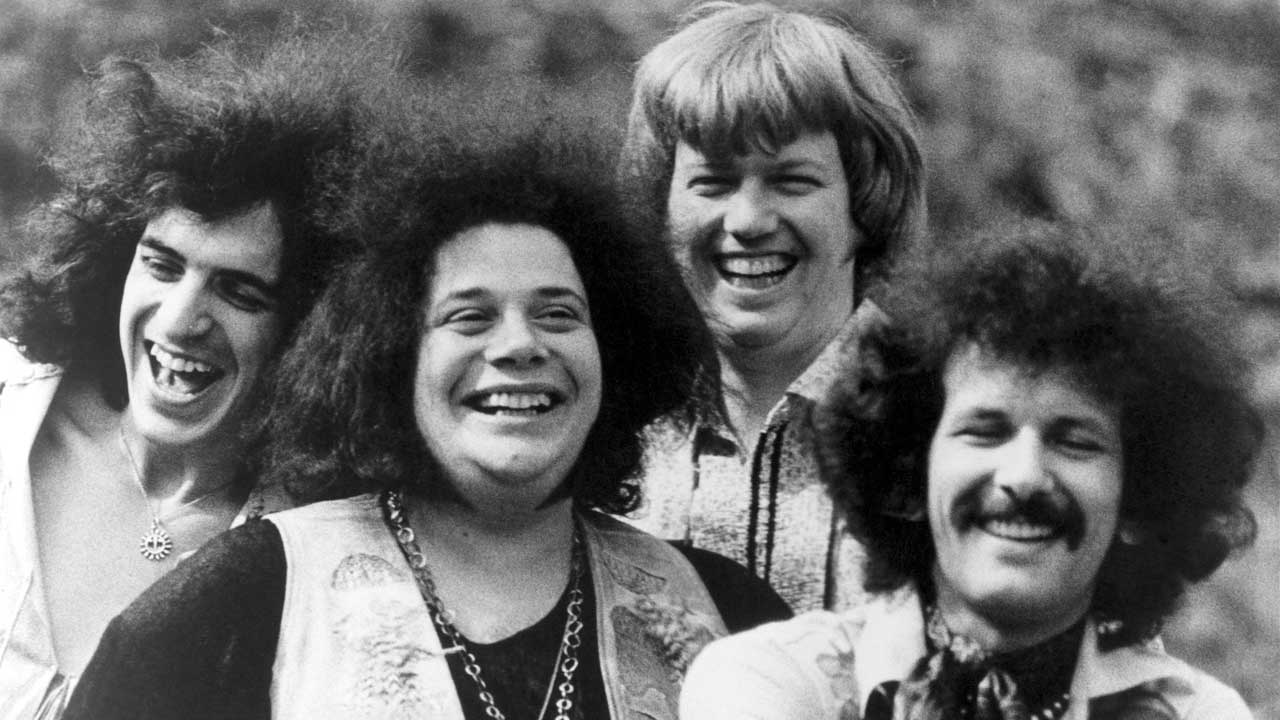(Don’t Fear) The Reaper, Blue Öyster Cult’s timeless paean to the inevitability of death, is unofficially recognised as the definitive cowbell-infused hard rock anthem. Its only serious rival is Mountain’s Mississippi Queen, recorded six years earlier on their debut album Climbing! in 1970.
Both bands were from New York City, but unlike BÖC’s pseudo-intellectualism, Mountain’s bombastic style was based on over-amplified white-boy blues and a deep-rooted appreciation of British power trio Cream. Mountain bassist Felix Pappalardi had produced albums by Cream, so considerable expectancy greeted the release of Climbing!
More than 50 years after the release of that debut album, and four decades after Pappalardi was shot dead by his wife Gail Collins, Mississippi Queen remains Mountain’s calling card.
The song was born on a hot and sweaty Saturday night in August 1969, as drummer Corky Laing – not even a member of the group at that point – attempted to play a club gig with his previous band, called [somewhat ironically] Energy, during a power cut.
“We were at a funky beach place called 30 Acres in Nantucket [an island off Cape Cod], and because it was so darned hot everyone had their air conditioning on, causing the entire island to black out,” Laing recalls. “The emergency lights came on, but the band stayed unplugged. Everyone was hyped on soul pills. A friend of mine was with a drop-dead gorgeous chick. She was from the south and wearing a see-through dress covered in flowers.”
Knowing it was up to him to keep the show going, Laing launched into a freeform drum solo, bellowing the words ‘Mississippi queen, do you know what I mean?’ repeatedly and hitting a cowbell maniacally – for more than an hour.
“I just had to keep this chick dancing, I was so turned on by her,” he shrugs. “But in screaming so loudly for so long I gave myself chronic laryngitis and screwed up my voice forever.”
It was an injury worth suffering. After joining Mountain, Laing told guitarist Leslie West about his promising chorus-cowbell combo. “But once he heard about it, Leslie just said: ‘Shut up’, and began playing this incredible riff,” Laing explains. Pappalardi suggested the signature double bass drum pattern. Like the rest of Climbing!, the finished track was recorded and mixed at The Record Plant in New York City.
Laing says that when it was released as a single Mississippi Queen “took over the airwaves” and pushed the album towards an instant half-million sales. “The airlines were on strike, so we had to go everywhere by bus,” he remembers. “Other bands stopped showing up [for gigs]. That made Mountain work harder still. We toured our asses off to get behind that song.”
Just 20 years old at the time and virgin to the machinations of the business, Laing admits that he was naive to allow Mississippi Queen be credited to the entire Mountain band. Alarm bells should have rung when he returning from a holiday in Canada, and Pappalardi and Gail Collins turned up to meet him at JFK Airport in a limousine.
“When Felix claimed to have helped me write the song, I just told him to go ahead and do what he thought was fair,” Laing sighs now. “He was the band’s producer, publisher, leader… everything. I was still a mere baby.”
The final name listed as a co-composer was David Rea, a guitarist acquaintance who had suggested amending ‘New Orleans’ to ‘Mississippi’ in the title.
“He was going to receive 10 per cent [of the song’s royalties] for that,” the drummer chuckles. “I was supposed to get 50 per cent, Leslie was due 30 per cent and Felix and David 10 each, but back then if you failed to break the song down into specific proportions, ASCAP [who collected airplay royalties from the radio stations] worked things out evenly. Everyone ended up getting 25 per cent each; Leslie and I were completely fucked. We lost hundreds of thousands of dollars.”
Laing still holds Pappalardi responsible for the contractual discrepancy over the band’s biggest hit, although the drummer adds with a grin:
“Good ol’ Felix has been dirt-napping for a number of years, but at least I’m still out there playing.”
Mountain recorded just two more studio albums before rows over drugs, sex and inflated egos brought about the band’s disintegration in 1972. Reunited sporadically during the 70s and 80s, West, Laing and ex-Frehley’s Comet bassist Richie Scarlet played together as Mountain from 2001 to 2011, until West had his leg amputated following complications from diabetes. He died in in 2020. Corky Laing is still performing.
Often listed among the most popular rock songs of all time, Mississippi Queen remains a staple of US classic rock radio.
Corky Laing's Mountain have three US dates lined up in early February.

